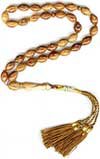Honor the Guest
I don't usually do this, but I could not resist. Higher-Criticism is an amazing blog. Written by a Muslimah who goes by the name SheilaX, this is an extraordinarily refreshing piece... one that is very important for all of us to consider.
Monday, November 07, 2005
Traditional Islam opposes ideological Islam. The latter seeks to undermine Islam's rich and diverse intellectual heritage by severing faith from its historical context. Traditional Islam, on the other hand, refers not only to the religion's origins in Mecca and Medina, but also to its later development by Persians, Mongols, Indians, Caucasians, Malays, Chinese; all of whom had been joined by their common love for God and His Last Messenger. Within this world view, the revelation is just as important as its unfolding in time and space. Whereas the revelation itself is unchangeable, the environment that surrounds it is not.
Islam's primary sources are the Koran and the sunnah. The sunnah is the actions and words of the Prophet Muhammad, performed and spoken in the unadulterated light of Divine Revelation. While much of the sunnah was passed down through actual practice by individuals and the community, its finer points rested in a body of writings called the hadiths.
Some customs were clear, others were not. These became seeds of conflict and division. The problem was so acute that Abu Bakr, in his reign as caliph, took steps to prohibit their narration. But as the early generations who had witnessed the Prophet's career began to pass on, the injunction gave way to the more pressing need of preserving the sunnah, especially through the tangled skein of the hadiths. (continue)
Monday, November 07, 2005
The fuss about traditional Islam
 Humble beads- victim of ideology. |
Islam's primary sources are the Koran and the sunnah. The sunnah is the actions and words of the Prophet Muhammad, performed and spoken in the unadulterated light of Divine Revelation. While much of the sunnah was passed down through actual practice by individuals and the community, its finer points rested in a body of writings called the hadiths.
Some customs were clear, others were not. These became seeds of conflict and division. The problem was so acute that Abu Bakr, in his reign as caliph, took steps to prohibit their narration. But as the early generations who had witnessed the Prophet's career began to pass on, the injunction gave way to the more pressing need of preserving the sunnah, especially through the tangled skein of the hadiths. (continue)


4 Comments:
I don't understand. What exactly does she mean by "ideological" Islam?
Salaam Alaikum:
As a Muslim writer, may I commend to you my humble effort, the book Master of the Jinn: A Sufi Novel, a mystical adventure tale on the Sufi path of Love. It has been translated and published in Russia, and will soon, inshallah, be translated and published in Indonesia, into Bahasa, the national language.
You can view the book and read an excerpt at http://www.masterofthejinn.com
In the Name of the Merciful, 10% of all profits go to charity.
Ya Haqq,
Irving
Salam,
This was a great article along with many others on Higher-Criticism, but I'm pretty sure she's Jewish and not a Muslimah. I don't know if that matters - either way, great content.
brother just to let you know it's makkah not mecca please right ok
Post a Comment
<< Home